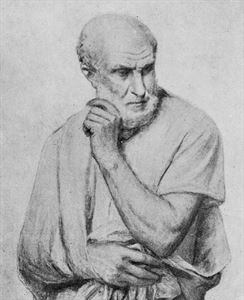Hippocrates

Hippocrates (c. 460-c. 380 B.C.) was a Greek physician who practiced medicine on the island of Cos. His theories were so influential he is often called the father of medicine. He challenged those of his time who used magic to cure disease, believing that the body-and diseases-worked by natural law; thus a physician could better heal by studying the body and finding the causes of disease. He also suggested that the health of a person depended on a balance of four "humors," or liquids, in the body: blood, black bile, yellow bile, and phlegm. This theory was still widely accepted even into the 1800s. The Hippocratic Oath has long been considered to be the model for ethical medicine, and many medical students still take a similar oath.